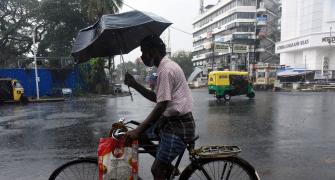In India, we have over a dozen official languages and countless local dialects. So how does a farmer from Bihar speak with a fisherman from Goa? The answer, for now, is 'not easily'.
One day, however, all Indians will use English as a first, second or third language. This will allow them to communicate effectively not only with other Indians, but also the rest of the world.
Of course, getting to that point won't be easy. For most of us, English is still a challenge. With all its irregularities, exceptions and rules, English is a very difficult language to master.
With that in mind, rediff.com presents our English Bloopers series. Here, we publish written and spoken mistakes spotted and sent to us by observant Get Ahead readers. It's a great way to review the basics, clarify a few issues and share a laugh or two!
So, stop by each Monday, Wednesday and Friday for another fresh batch of English Bloopers.
Ms Deval Motka, a senior software engineer working in a Mumbai based company, sent this helpful guide:
During my daily conversations with people and also in emails, I come across grammatical errors in the usage of past and present tenses.
Many of us forget grammatical rules and theory. Still, it would be nice to hear some commonly used sentences without grammatical mistakes.
A common mistake while making sentences in the past tense is the usage of the word 'did'.
Wrong: I didn't went to New York in the last year.
Correct: I didn't go to New York in the last year.
Wrong: I did called her last week.
Correct: I did call her last week.
Question: Have you ever been to the US?
Wrong: I go to the US last year.
Correct: I did go to the US last year.
Question: Didn't you eat last night?
Wrong: I did ate.
Correct: I did eat.
'Did' indicates that the action has happened in the past. Hence, the other verb should be in present tense.
Also, 'Did' / 'Do' are used to stress a point. For example:
Question: Did you go to America last year?
Correct: I did.
Question: Does anybody here speak French?
Answer: I do.
There is a mistake many of us make while using the present tense. There are two form of the present tense.
The simple present tense
The present continuous tense
The simple present tense is used for two main types of action:
Habits - Actions which happen regularly (every day, every week, etc.)
Example - Sneha goes to class every day.
Explanation - Doing something "Every day" makes it a habit.
States of being - Things which do not often change (opinions, conditions, etc.)
Example - Pramod lives in Mumbai.
Explanation - This is a state of being, because it will not change (or change infrequently).
The present continuous tense is used for two main types of action:
A temporary action happening now (but it will stop in the future).
Example - It's raining outside.
Explanation - It's raining right now, but it may stop soon.
A definite plan for the future. Something we intend to do, usually in the near future.
Example - The Olympics are taking place here next year.
Explanation - This is already certain.
Examples
Wrong: I am getting up every day at 6 am.
Correct: I get up every day at 6 am.
Wrong: I have a party next week.
Correct: I am having a party next week.
VK Kanniappan, 62 years and a doctor from Karaikal, sent these bloopers he's heard and read:
Wrong: What is the madision for psoriasis?
Correct: What is the medicine for psoriasis?
Wrong: If you are not esperience, try to get help.
Correct: If you have no experience, try to get help.
Wrong: Suppose if you knows the value, then why you fear to buy?
Correct: If you know the value, why are you afraid to buy?
Wrong: Myself working in a MNC.
Correct: I am working in a MNC.
DON'T MISS
If you'd like to share common bloopers you come across when people speak/ write in English, do mail your list, along with their correct alternatives to englishbloopers@rediffmail.com -- we'll highlight them right here as a helpful guide to those trying to improve their English. Also, make sure you include your FULL NAME, AGE, OCCUPATION and the CITY you are based in.







